Are you wondering how to use AI for SEO? You’re not alone; the good news is you don’t need to be a tech expert to make it work for you.
AI isn’t just a term; it’s making life easier in various industries, including SEO and online marketing. It can help your business show up higher in search results.
Have you ever heard that over 58% of marketers use AI for SEO and marketing, and they have noticed a great increase in performance?
It’s true.
These professionals use AI to figure out the best keywords, design SEO strategies, optimize their web pages, and even personalize the experience for each visitor.
It is not easy to use AI for SEO, but the reality is the opposite.
It is very simple and straightforward to use AI tools for SEO and lift your game up.
Let’s learn how to do it.
What is AI for SEO?
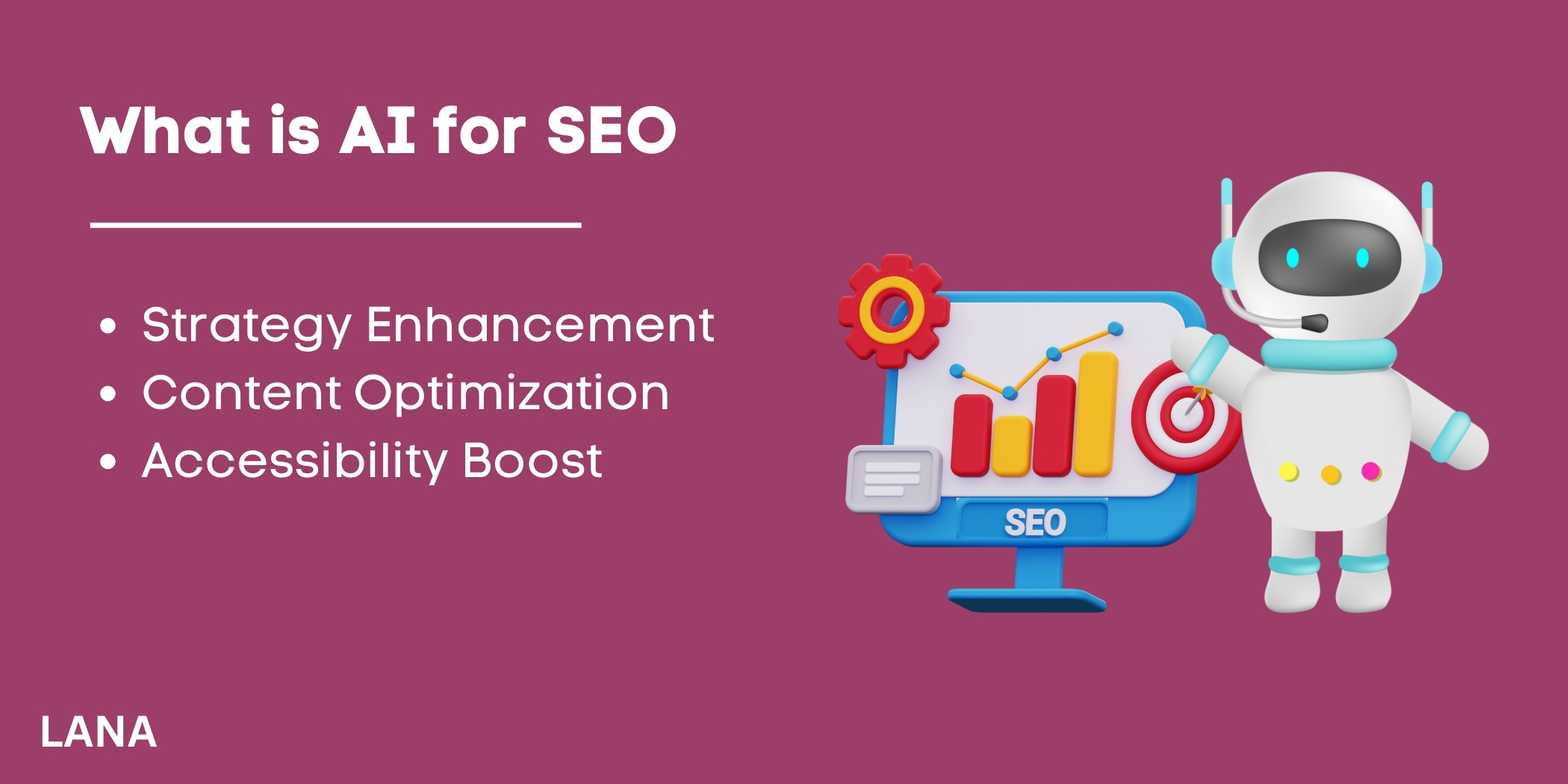
AI has already been integrated into several aspects of our lives. If you’ve used voice search on your phone or navigated with Google Maps, you’ve experienced the convenience of AI tools.
Even Grammarly, a popular writing assistant, uses AI to enhance your content by correcting spelling errors and grammatical issues.
AI for SEO operates similarly, enhancing your search engine optimization efforts. It levels the playing field by making complex data analysis and SEO strategies accessible to everyone, not just SEO professionals.
How to Use AI for SEO: Step-by-Step Guide
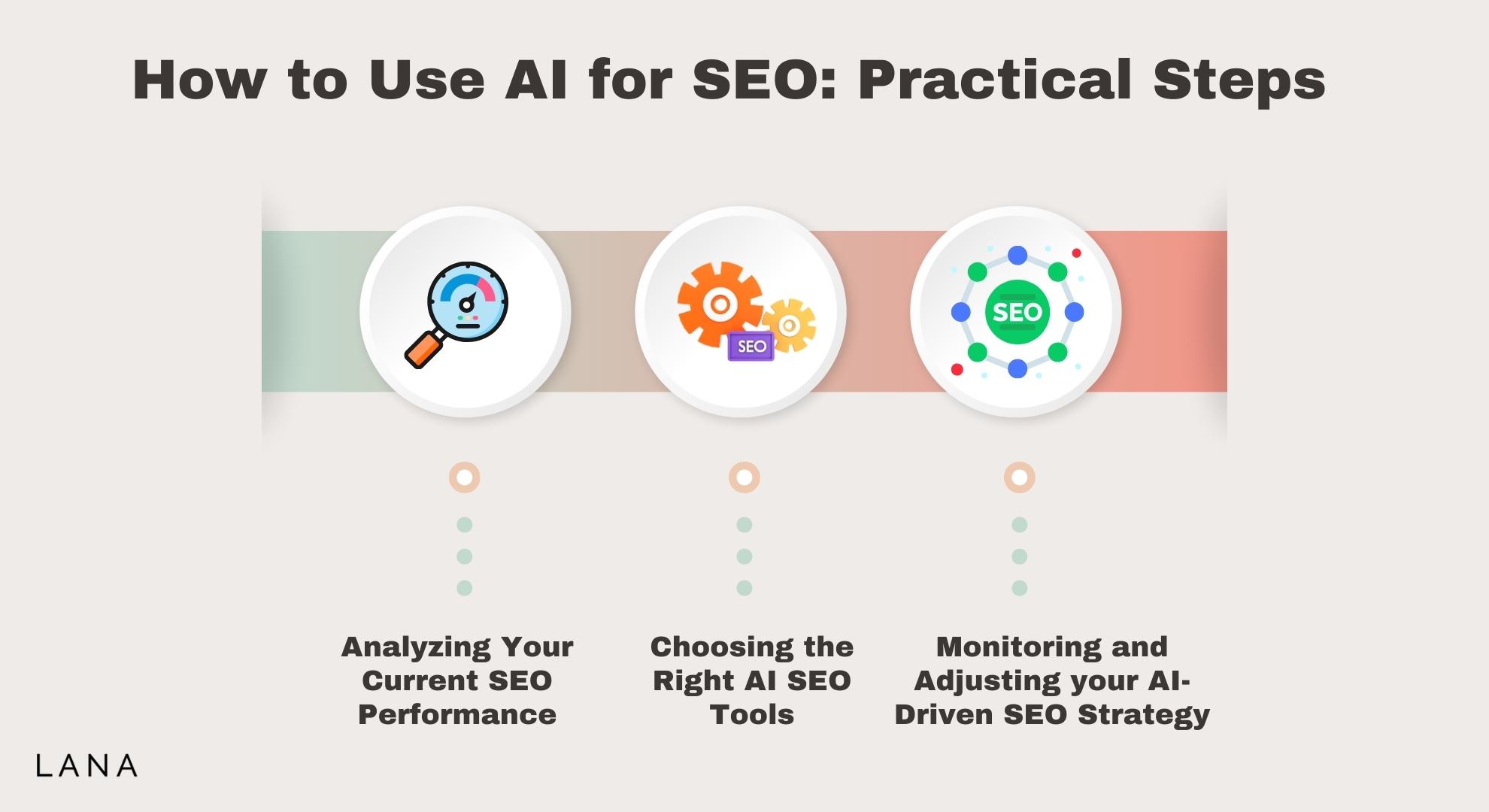
A game plan to make the most of AI for SEO is essential. You should access currently where you stand regarding SEO performance, picking the right AI SEO tools for your needs, and regularly tweaking your SEO strategy based on AI-generated insights.
Following my steps below will put you ahead of the competition and allow you to reap the benefits of AI SEO.
Step 1: Analyzing Your Current SEO Performance
Evaluating your current SEO performance is crucial before using AI for your efforts.
Knowing where you stand helps you identify what needs improvement and set meaningful targets for your AI-enhanced SEO strategy.
Businesses should focus on several key metrics, including:
- Keyword rankings
- Organic traffic
- Time spent on the page
- Click-through rate (CTR)
- Bounce rate
- Returning visitors
- Domain authority
For this assessment, you can rely on various SEO tools such as Google Analytics, Google Search Console, Google’s PageSpeed Insights, Ahrefs, and other trusted SEO software.
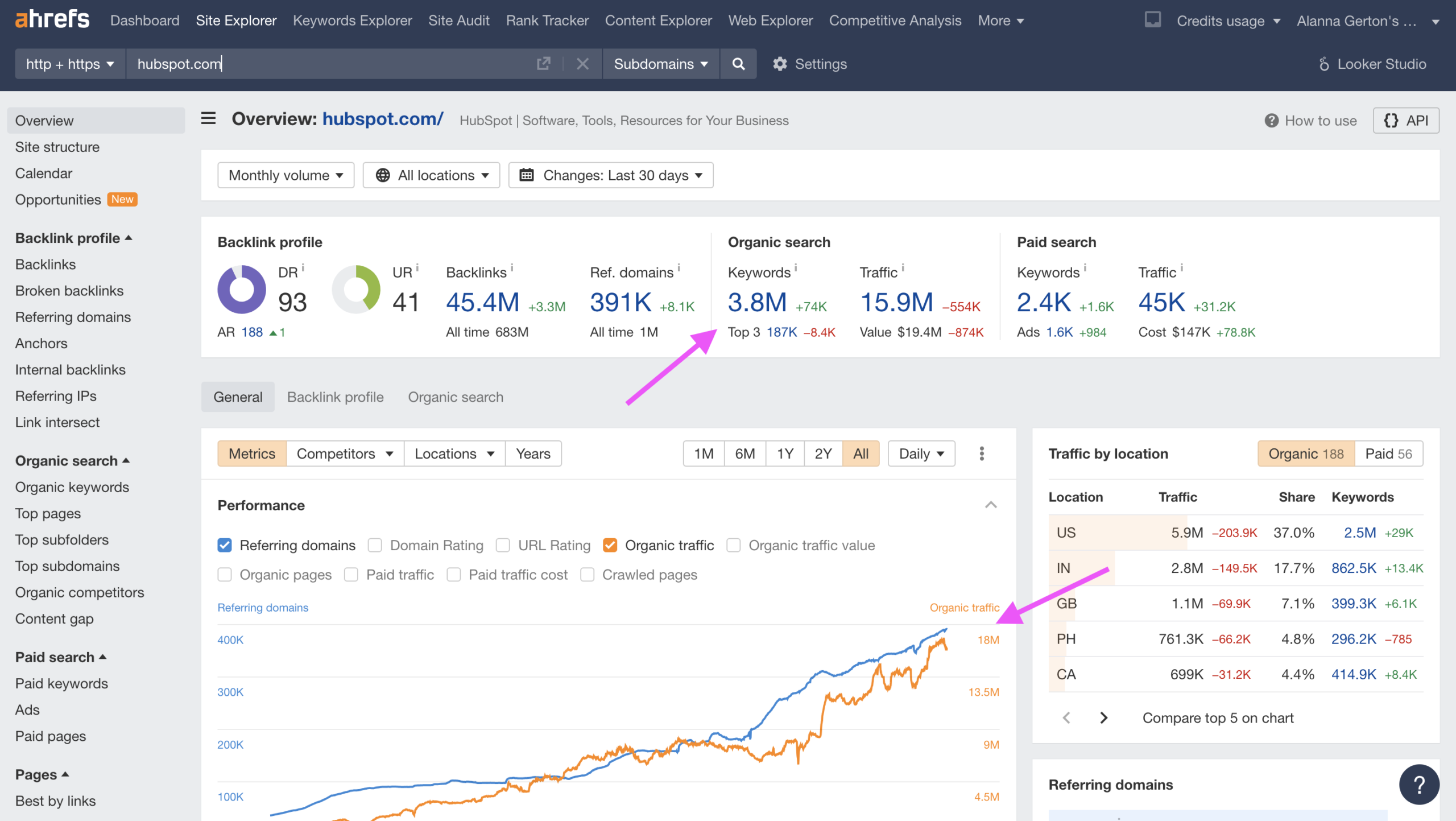
These tools allow you to track your performance metrics, providing the insights you need to make data-driven decisions to boost your online visibility.
Step 2: Choosing the Right AI SEO Tools
Once you’ve got a grip on your current SEO performance, it’s time to select the AI tools that align with your business goals.
When trying to find the best AI SEO tools, there are plenty options out there like Semrush or Ahrefs.
My personal favorite and one AI SEO tool that I will give most of my keyword success to is Surfer SEO.
SurferSEO offers functionalities ranging from keyword research and content optimization to site-wide optimization rules.
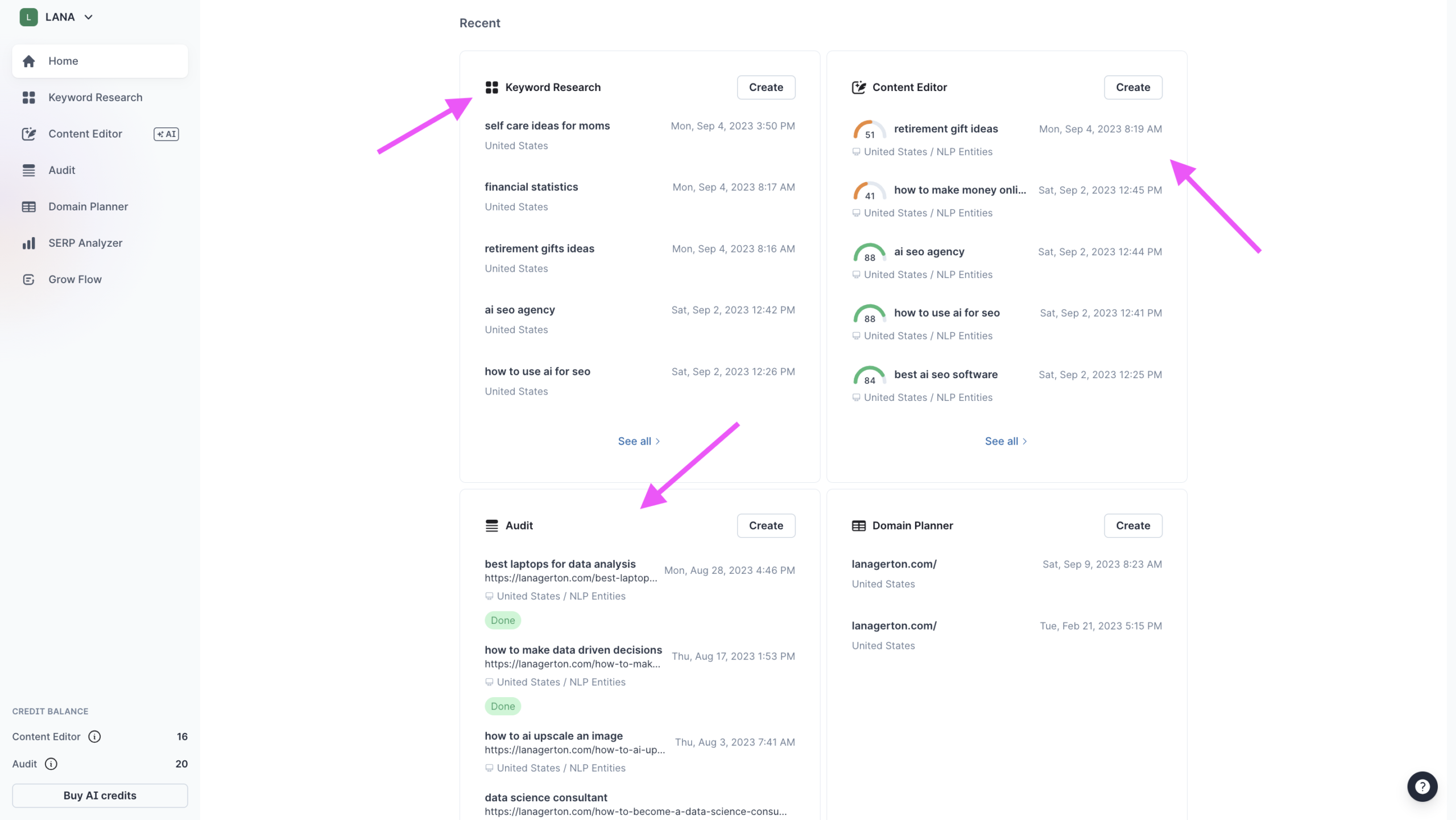
Platforms, like Answer the Public, AI headline generators, and copywriting tools help you transform your ideas and content to perfection.
Step 3: Monitoring and Adjusting your AI-Driven SEO Strategy
Ongoing monitoring is crucial when it comes to AI for SEO. Using AI SEO tools that allow for real-time tracking and adjustments will help you adapt to market changes and shifts in user behavior.
Also, tools like Google Analytics or Adobe Analytics can help you continuously assess your site’s performance.
These AI tools can help you refine your SEO strategy, ensuring your site’s continued growth and better rankings of search engine results pages (SERPs).
What can AI do for your SEO strategy?
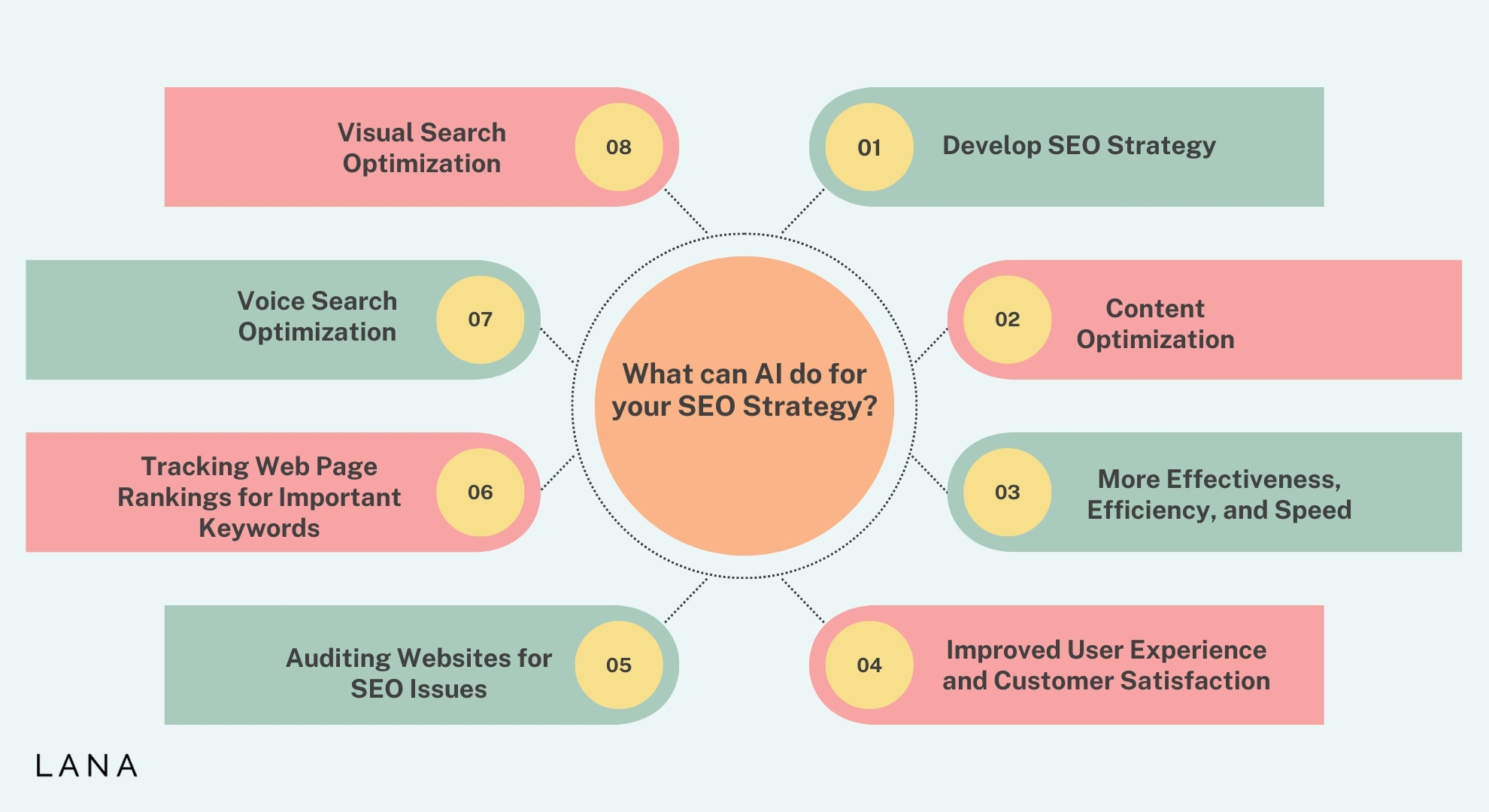
AI can boost your SEO strategy, helping you leave your competitors behind. Let’s look at the positive aspects of integrating AI into your SEO approach.
Develop SEO Strategy
AI is more than just a helping hand in keyword research; it’s a game-changer for building a comprehensive SEO strategy.
AI can give you content ideas for what to write about.
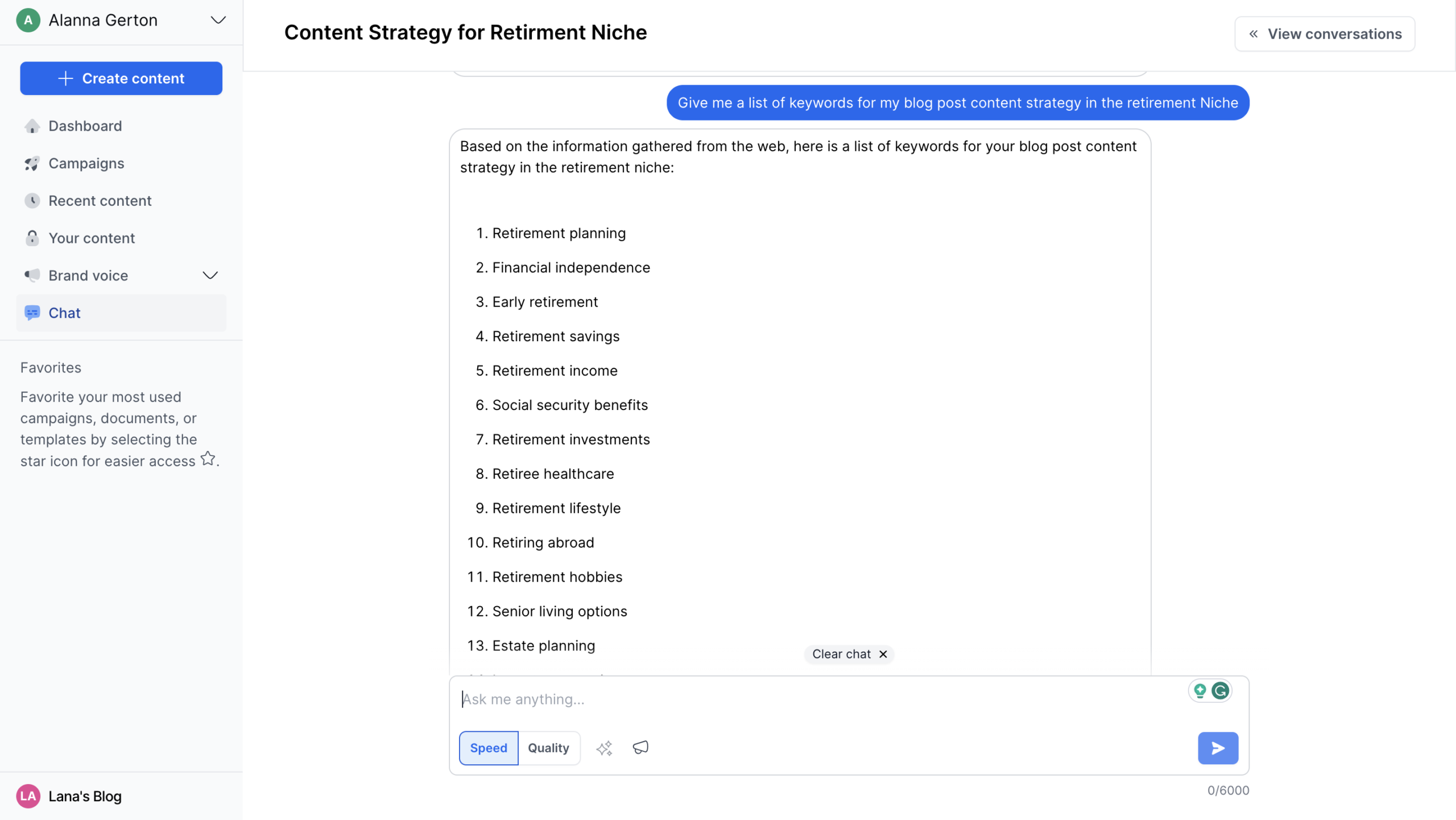
It can even help you design SEO and marketing strategies quicker than any employee.
With these suggestions, you can stand out and fill any content gaps. You can then build it out with the keyword metrics in a simple google sheet.

AI tools can also identify related topics and search queries you should cover.
Content Optimization
AI isn’t just for long-term SEO strategy; it’s also great for enhancing individual posts quickly.
AI tools like Jasper or Writesonic can help plan your overall content strategy and analyze how effective each part of the content is.
They can guide you on what topics to focus on, how to get an edge over competitors, and even what length and quality your article should be.
AI tools use “content briefs” to offer a full list of tips for improving your content. They can suggest questions to tackle and where to place specific links within your content.
Here are some AI tools every content creator should consider using to improve their written content:
- SurferSEO
- Grammarly
- Hemingway Editor
- Yoast SEO or Rank Math
- Headline Studio
I personally use SurferSEO’s content audit feature to optimize my blog posts.
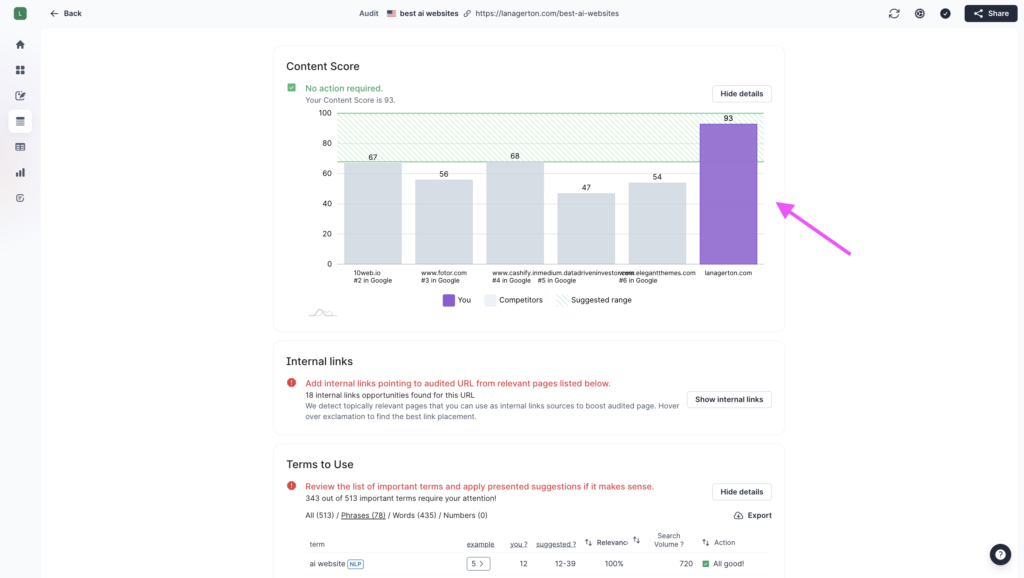
Remember, though, chasing a high SEO score shouldn’t be your only goal. While these SEO tools offer useful tips, they can’t promise a top-ranking article.
The main aim is always to provide your readers with meaningful and relevant content.
More Effectiveness, Efficiency, and Speed
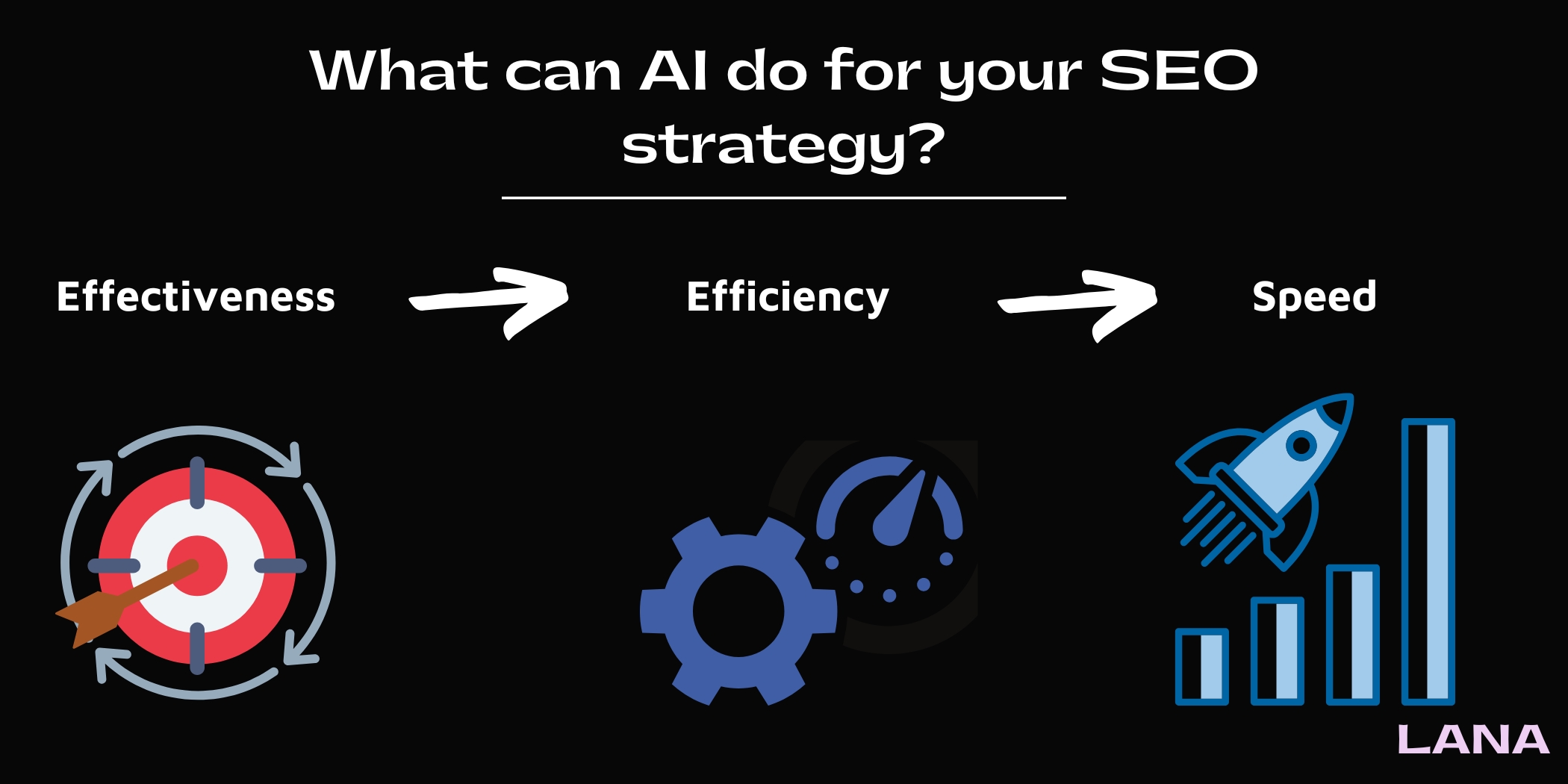
Leveraging AI for your SEO efforts makes you more effective and boosts your efficiency and speed in managing digital marketing strategies.
Consider this: AI is highly automated, which allows you to cut down on lengthy, time-consuming tasks, saving time and money.
You can avoid hiring developers to code software, freeing you up to focus on the strategic planning and execution of your content creation.
The insights you can gather with the AI SEO tool are remarkably accurate and current, helping you make well-informed business choices and enhance productivity.
Improved User Experience and Customer Satisfaction
Enhancing user experience and customer satisfaction is the ultimate goal of all AI tools, including those designed for SEO.
AI aims to improve the lives of both you and your clients. So, what’s the result when you offer clients hyper-personalized services and products through the help of AI tools?
They’re more likely to return and share their positive experiences with your brand, driving more organic traffic your way.
Pro Tip: You can use AI email generators to speed up your marketing process and increase your visitors or customers.
Auditing Websites for SEO Issues
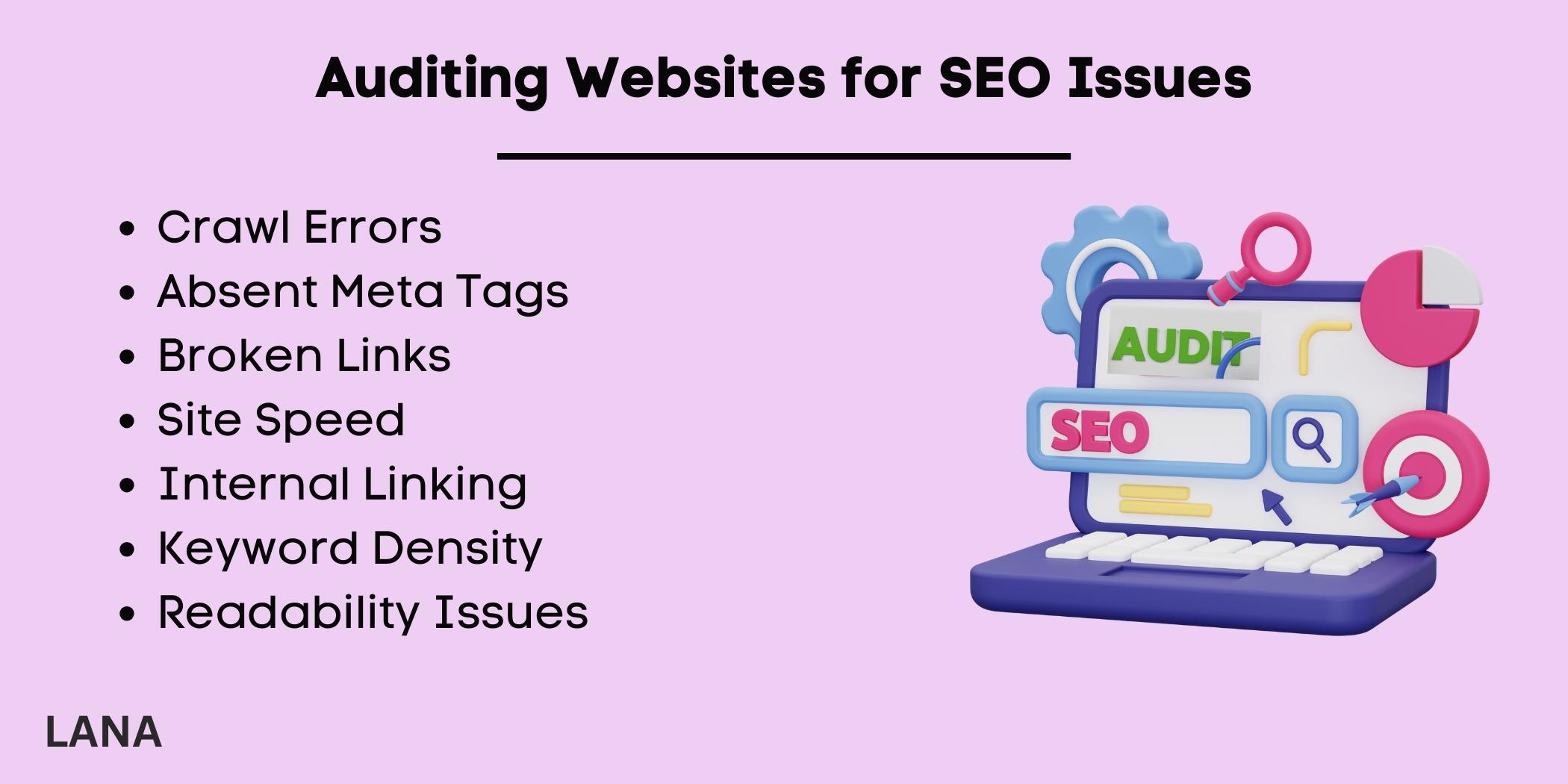
You probably already use Screaming Frog, SEO Surfer, or Semrush to monitor your website. If not, it’s a good time to try.
With these tools, you can study every aspect of your website—including the root domain, subdomains, subfolders, and mobile versions—to find problems in technical SEO, on-page optimization, site speed, and internal linking.
They generate an SEO audit report outlining crawl errors, absent meta tags, broken links, thin or duplicate content, and more.
You can also leverage AI to scale each page’s keyword density and readability, ensuring your content is both search engine and user-friendly.
SEO professionals can then examine the audit data to decide which errors need immediate attention.
Tracking Web Page Rankings for Important Keywords
After your content goes live, the next step is to monitor its rankings, and AI also comes to the rescue.
Using AI SEO tools, you can swiftly identify the search terms your content ranks for, tracking hundreds or even thousands of them.
For your target keywords, these tools allow you to monitor how your content moves up or down in search engine results over time.
AI tools offer real-time monitoring, generate SEO reports, and provide insights into ranking variations, enabling businesses to tweak their SEO strategies as needed.
For example, Zutrix leverages artificial intelligence to clean search engine results pages (SERPs) in a human-like manner, ensuring you receive precise data on your content’s ranking status.
Voice Search Optimization
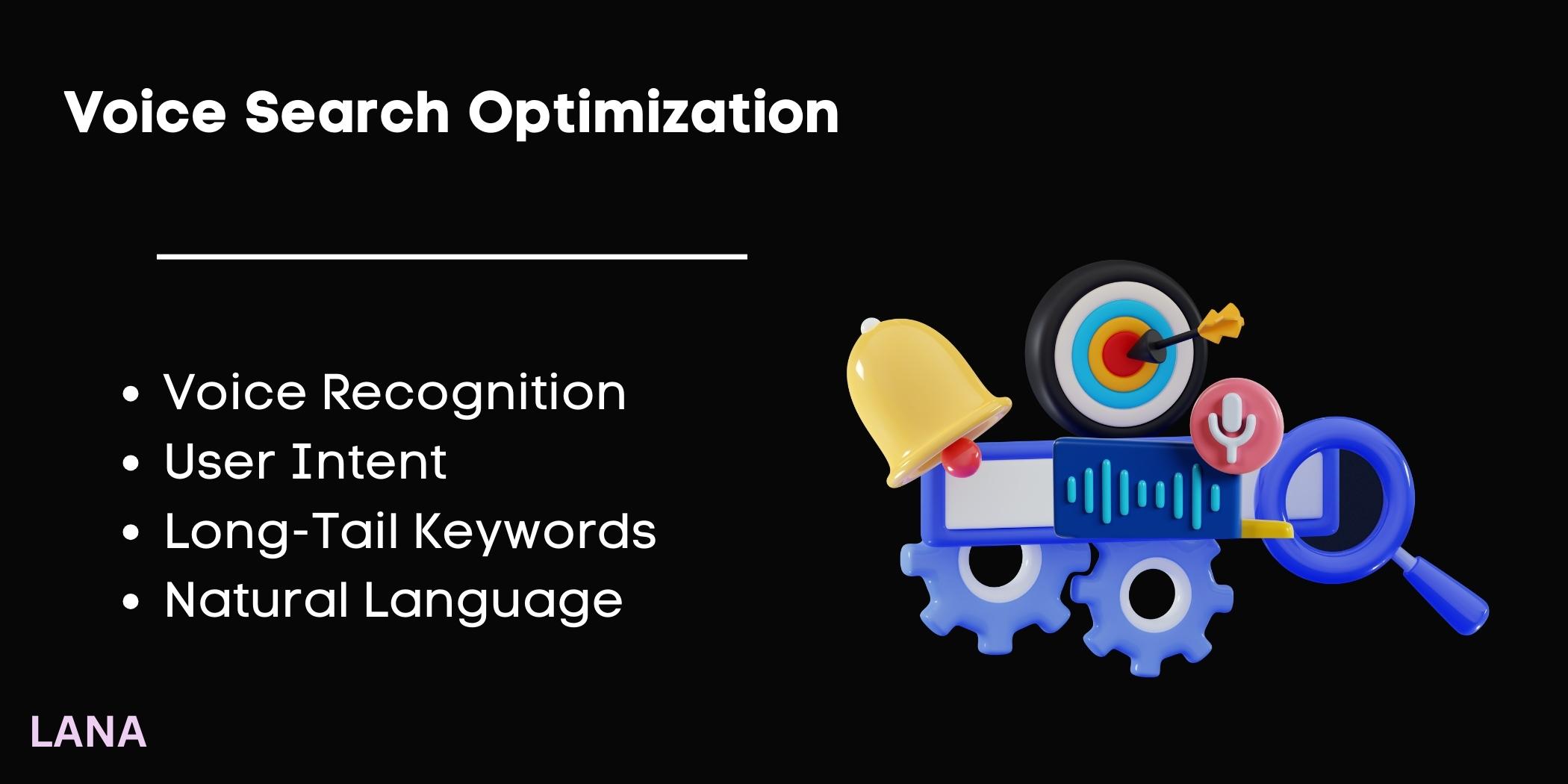
The growing popularity of voice assistants such as Amazon’s Alexa, Apple’s Siri, and Google Assistant has significantly expanded the volume of voice search queries.
As AI technology advances, so does voice recognition, making voice search an increasingly critical component of SEO strategy.
To fine-tune for voice search, emphasis must be on natural language processing and using long-tail keywords.
AI tools can assist in analyzing voice search data, decoding user intent, and delivering valuable insights for businesses aiming to tailor their content for voice search optimization.
Visual Search Optimization
Visual search is another domain in which AI is becoming increasingly dominant. Services like Google Lens and Pinterest Lens allow us to search using images rather than text.
Thanks to AI image recognition capabilities, these technologies can identify what’s within images, facilitating easier indexing and comprehension by search engines.
For businesses to take advantage of this visual search trend, it’s essential to enlarge images with relevant metadata and guarantee that the visual content on their websites is readily accessible.
AI tools can assist in examining and fine-tuning images, enhancing their indexability by search engines and thereby increasing the likelihood of achieving higher visual search rankings.
Smart Markup
Tags serve as quick-access markers linking varied types of content, from blog posts to images. Tags could represent names, concepts, or events.
AI tools are now available to automatically assign these tags, making content more accessible for internet users.
Risks and Challenges of AI in SEO
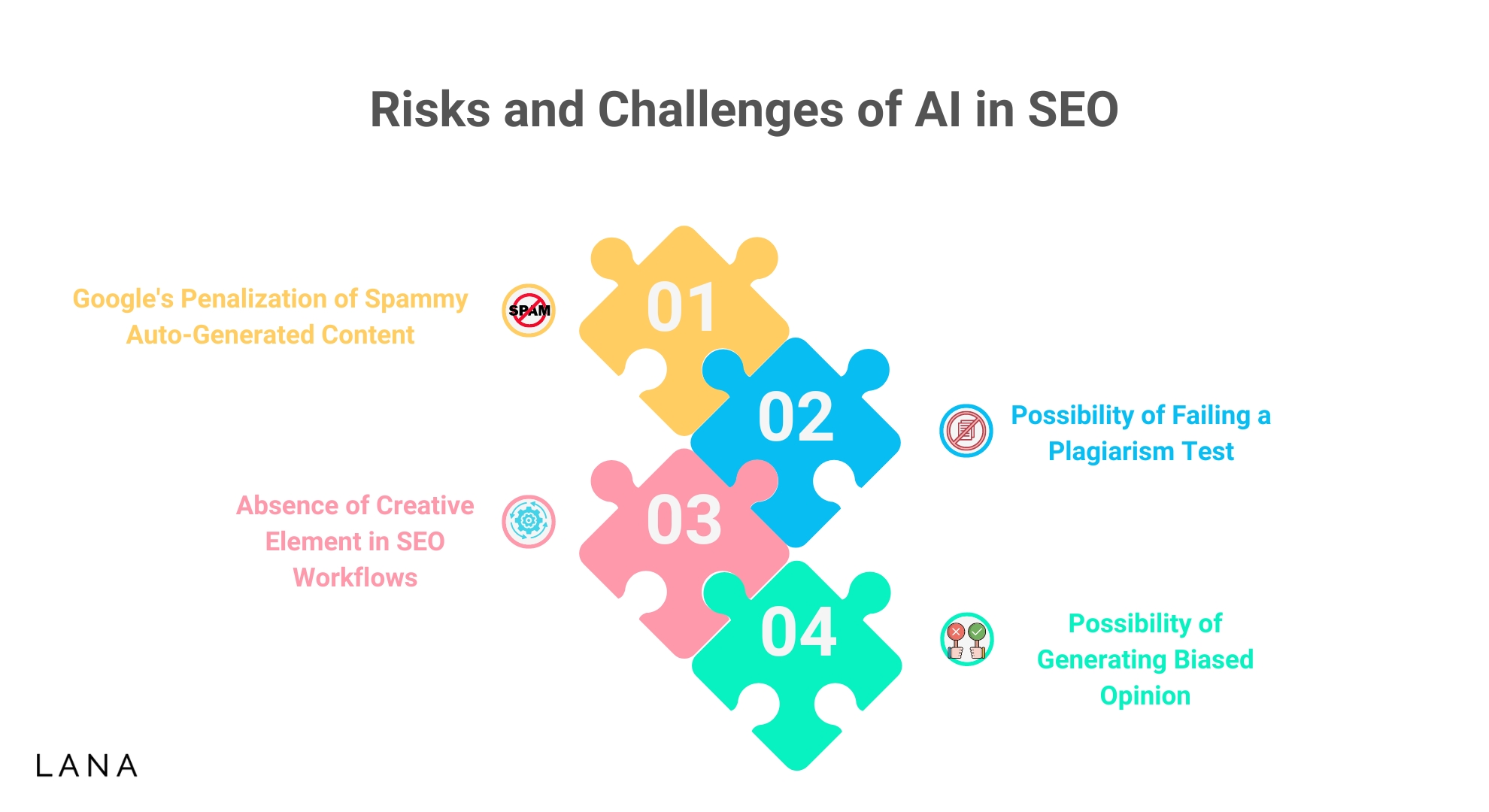
There are still certain risks and challenges in the field of SEO, even if AI has a lot of potential positives.
1. Google’s Penalization of Spammy Auto-Generated Content
A major risk in using AI for SEO is Google’s penalization for spammy auto-generated content that lacks user value.
Even though SEO tools using advanced NLP models are beneficial for generating content, the human touch is necessary to edit the content to avoid being flagged by Google as inauthentic.
2. Possibility of Failing a Plagiarism Test
Certain AI tools like ChatGPT-3 use existing internet content for model training, which risks generating content that doesn’t pass plagiarism tests.
Verifying the originality of such content and tracking its author for citation becomes an additional step to ensure accuracy.
3. Absence of Creative Elements in SEO Workflows
If AI is used extensively for SEO tasks, it could take away the creative parts of SEO workflows and make more repetitive content than the original.
4. Possibility of Generating Biased Opinion
NLP models, trained on internet data, may generate biased opinions, especially for topics lacking comprehensive coverage.
Smaller niches need help identifying content, demanding extra attention to avoid removing specific customer segments.
Benefits of Using AI SEO Tools
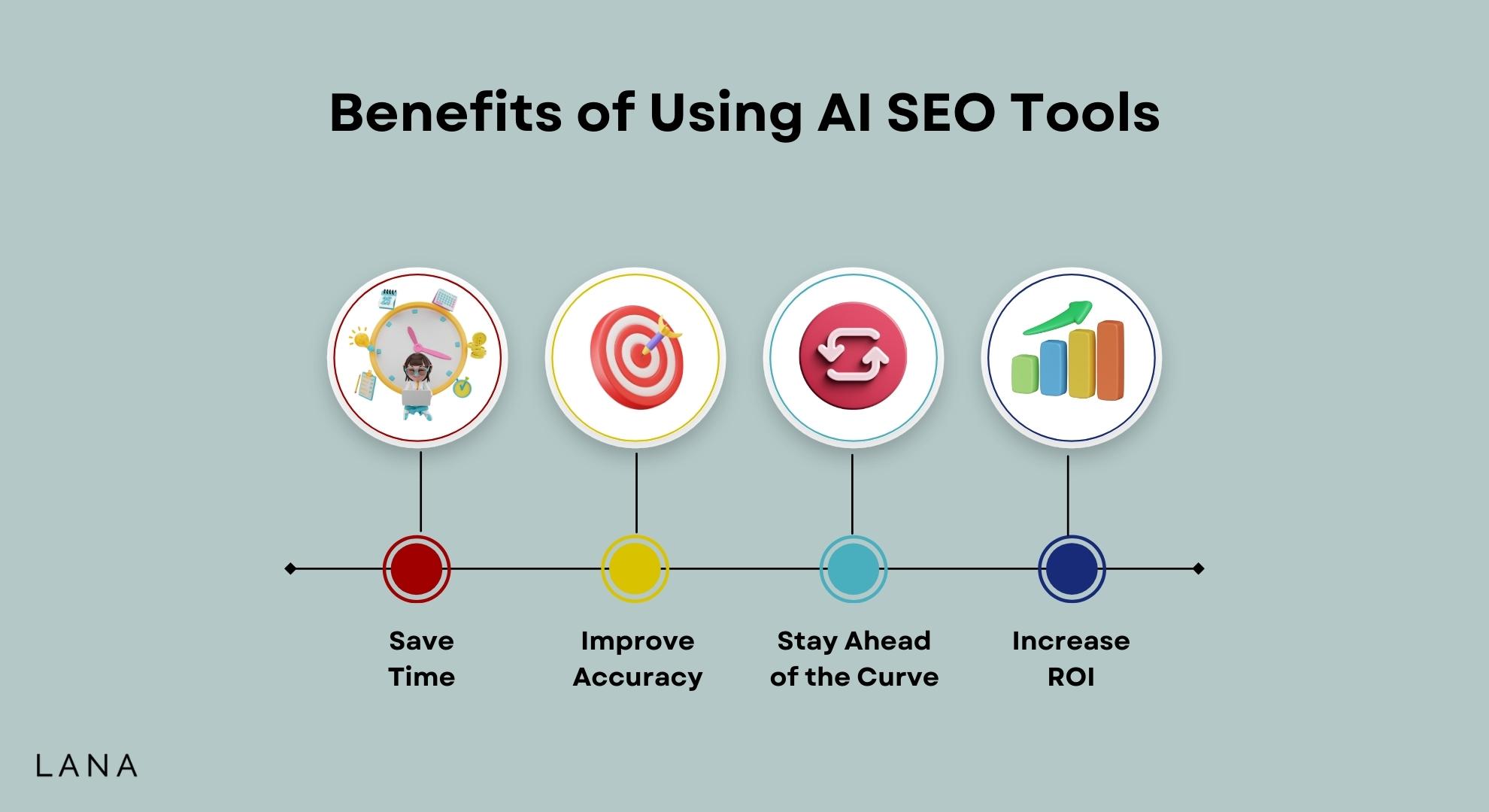
AI SEO solutions are changing the game by making it easier to deal with the shifting nature of SEO. Let’s take a closer look at the numerous benefits these AI platforms offer for your SEO efforts:
- Save Time: Manual SEO tasks can be boring and time-consuming. AI SEO tools automate many of these difficult activities, freeing you up to focus on strategic decisions.
- Improve Accuracy: AI algorithms excel at data analysis, spotting insights that might avoid human analysis. Utilizing AI in your SEO approach delivers more accurate, actionable data for better decision-making.
- Stay Ahead of the Curve: The unpredictable nature of SEO requires constant updates. AI SEO tools provide real-time trend analysis, keeping you ahead of the curve in an ever-changing landscape.
- Increase ROI: SEO can be a significant investment, but businesses that invest in SEO are 13 times more likely to see a positive ROI. AI SEO tools fine-tune your strategy to maximize returns on your investment.
So there you have it. AI is reshaping the SEO industry, offering many advantages to stay competitive and efficient. The use of AI for marketing is providing business owners with exceptional results.
Key Considerations For Successfully Using AI for SEO
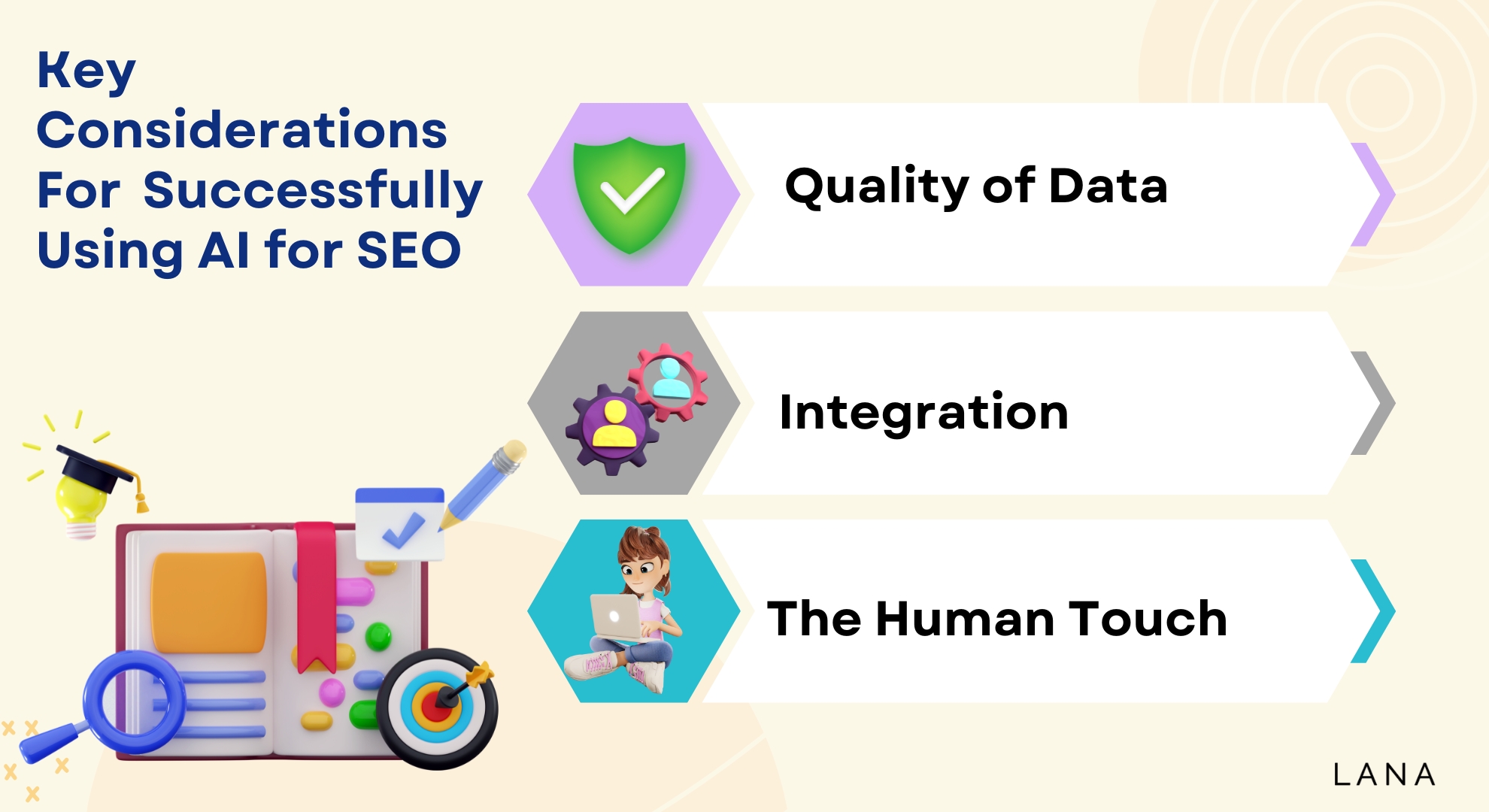
While AI holds massive potential for your SEO strategy, here are several crucial considerations to bear in mind:
1. Quality of Data
The efficacy of your AI tools is naturally linked to the data you provide. The old proverb says, “Garbage in, garbage out.” Make sure your data is accurate and comes from reliable sources.
For example, using AI story generators, you must provide proper prompts, background info, and details to create a captivating story.
2. Integration
Deploying AI for SEO isn’t a one-off task; it demands seamless integration with your current technological framework.
A smooth integration can prevent many future difficulties, whether using Google Analytics, a CRM, or specialized marketing platforms.
3. The Human Touch
While AI is transformative, it can only partially replace the unique human insights you bring to brand storytelling and customer interactions.
Let AI manage the heavy-duty data analysis and steer your strategic decisions, but never forget—you’re in the driver’s seat!
If you consider these important factors, you will have the highest probability of success while using AI for SEO.
Taking it to the Next Level: How to Use AI for SEO?
Ready to level up your SEO expertise through AI? After mastering the basics, you can move on to more advanced features like NLP and predictive analytics.
You can predict trends, understand user intent, and optimize content creation with the help of AI for SEO’s innovative features.
You’ll feel like an SEO expert, naturally knowing what your audience craves before they even realize it.
But hold on, the journey doesn’t end here. The AI and SEO landscapes are evolving, so continuous learning is crucial to remain at the top of your game.
Final Thoughts
When I started learning how to use AI for SEO, I was mainly looking for ways to make my work easier and my efforts more effective.
Integrating AI into my SEO strategies saved me hours of manual work and gave me insights I might have missed otherwise.
I’m talking about finding new keywords I hadn’t thought of and spotting issues on my website that I didn’t even know existed.
With the help of AI, my site began climbing in search engine rankings.
It was a real win. So, if you’re considering using AI for SEO, I can tell you from my experience that it’s worth it.
But remember that SEO and AI are both always evolving. So, keep an eye on new updates and tools to stay on top of your game.
Frequently Asked Questions
What is AI in SEO?
In SEO, AI works to refine your existing strategy by identifying new opportunities like relevant keywords.
Using advanced algorithms, AI speeds up and elevates the accuracy of various tasks such as keyword research, competitor scrutiny, and understanding search intent.
How does AI impact SEO?
AI positively impacts SEO by enhancing its accuracy, efficiency, and performance. While there may be concerns that AI could replace human SEO roles, it is mainly a supportive tool, making SEO strategies more effective.
Is AI the future of SEO?
Yes, AI is becoming increasingly vital in the future landscape of SEO. With its capabilities to perform a wide array of functions and analyze vast amounts of data, AI is becoming a go-to for companies aiming to boost their SEO. Early adopters stand to gain the most benefits.
How do AI SEO Tools work?
AI SEO tools employ intricate algorithms to sift through data and offer insights into multiple surfaces of SEO.
These include but are not limited to keyword research, sizing up competitors, and optimizing content.
What are the benefits of using AI for SEO?
AI SEO tools offer numerous benefits, such as time-saving, augmented accuracy, staying ahead of evolving trends, and amplifying ROI.

About The Author
Lana is a full time content creator, blogger, and SEO strategist. She coaches up-and-coming bloggers over at Blog Growth Engine and helps select SaaS startups with their SEO and content strategy. Before starting this blog, Lana was the VP of Engineering at an AI startup and a Data Scientist for over 6 years. She also holds a Bachelor of Science Degree in Statistical Data Science from the University of California, Davis. Follow LanaGerton.com to learn how she blends data-driven approaches and AI technology into her content creation and SEO frameworks.






